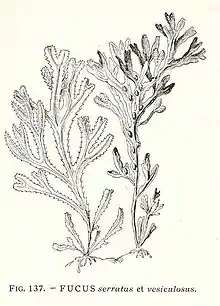fucus
See also: Fucus
English
Etymology
From New Latin Fūcus, from Ancient Greek φῦκος (phûkos).
Pronunciation
- IPA(key): /ˈfjuː.kəs/
Noun
fucus (plural fuci or fucuses)
- Any alga of the genus Fucus.
- a. 1813, Sir Humphry Davy, "Lecture VI" in Elements of Agricultural Chemistry (1840 reprint):
- Sea-weeds, consisting of different species of fuci, algæ, and confervæ, are much used as a manure on the sea-coasts of Britain and Ireland.
- 1853, John Ruskin, “Torcello”, in The Stones of Venice, volume II (The Sea-Stories), London: Smith, Elder, and Co., […], →OCLC, § I, page 11:
- One of the feeblest of these inlets, after winding for some time among buried fragments of masonry, and knots of sunburnt weeds whitened with webs of fucus, stays itself in an utterly stagnant pool beside a plot of greener grass covered with ground ivy and violets.
- a. 1813, Sir Humphry Davy, "Lecture VI" in Elements of Agricultural Chemistry (1840 reprint):
French
Pronunciation
- IPA(key): /fy.kys/
Audio (file)
Further reading
- “fucus”, in Trésor de la langue française informatisé [Digitized Treasury of the French Language], 2012.
Latin
Pronunciation
- (Classical) IPA(key): /ˈfuː.kus/, [ˈfuːkʊs̠]
- (modern Italianate Ecclesiastical) IPA(key): /ˈfu.kus/, [ˈfuːkus]
Etymology 1
From Ancient Greek φῦκος (phûkos, “seaweed, orchil”).
Noun
fūcus m (genitive fūcī); second declension
Declension
Second-declension noun.
| Case | Singular | Plural |
|---|---|---|
| Nominative | fūcus | fūcī |
| Genitive | fūcī | fūcōrum |
| Dative | fūcō | fūcīs |
| Accusative | fūcum | fūcōs |
| Ablative | fūcō | fūcīs |
| Vocative | fūce | fūcī |
Derived terms
Descendants
- → Welsh: ffug
Etymology 2
From Proto-Italic *foikos, from Proto-Indo-European *bʰoy-ko-s, from *bʰey-.[1] Cognate with Old Irish bech, English bee, and possibly Ancient Greek σφήξ (sphḗx, “wasp”).
Noun
fūcus m (genitive fūcī); second declension
Declension
Second-declension noun.
| Case | Singular | Plural |
|---|---|---|
| Nominative | fūcus | fūcī |
| Genitive | fūcī | fūcōrum |
| Dative | fūcō | fūcīs |
| Accusative | fūcum | fūcōs |
| Ablative | fūcō | fūcīs |
| Vocative | fūce | fūcī |
Descendants
- Italian: fuco
References
- De Vaan, Michiel (2008) “fūcus”, in Etymological Dictionary of Latin and the other Italic Languages (Leiden Indo-European Etymological Dictionary Series; 7), Leiden, Boston: Brill, →ISBN, pages 245–6
- “fucus”, in Charlton T. Lewis and Charles Short (1879) A Latin Dictionary, Oxford: Clarendon Press
- “fucus”, in Charlton T. Lewis (1891) An Elementary Latin Dictionary, New York: Harper & Brothers
- fucus in Charles du Fresne du Cange’s Glossarium Mediæ et Infimæ Latinitatis (augmented edition with additions by D. P. Carpenterius, Adelungius and others, edited by Léopold Favre, 1883–1887)
- fucus in Gaffiot, Félix (1934) Dictionnaire illustré latin-français, Hachette.
- “fucus”, in Harry Thurston Peck, editor (1898), Harper's Dictionary of Classical Antiquities, New York: Harper & Brothers
- “fucus”, in William Smith et al., editor (1890), A Dictionary of Greek and Roman Antiquities, London: William Wayte. G. E. Marindin
This article is issued from Wiktionary. The text is licensed under Creative Commons - Attribution - Sharealike. Additional terms may apply for the media files.
